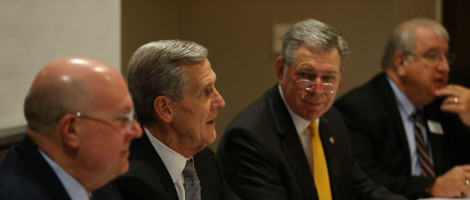
Hospital administrators discuss major challenges facing health care
by Sheila Boggess on November 16, 2016 in Annual Meeting
Three nonprofit hospital administrators emphasized the need for everyone to learn about advanced directives when it comes to health care during a workshop Tuesday at the Texas Baptists Annual Meeting.
The panel included Joel Allison, president and chief operating officer (COO) at Baylor Scott & White Health; Tim Lancaster, president and COO of Hendrick Health System in Abilene, and Glenn Robinson, president and COO of Baylor Scott & White-Hillcrest in Waco.
“The Challenges of Health Care Today and Tomorrow” workshop was moderated by Steve Vernon, associate executive director of Texas Baptists, who started the one-hour discussion with the question, “What is the challenge for nonprofits?”
“It’s a constant struggle to take care of all who come,” said Lancaster. “Texas leads the nation in the largest number of uninsured people.”
Allison said one of his board members reminded him that, “we’re not-for-profit, but remember, we’re not for loss, either.”
Robinson said hospitals are really struggling, and there is not much wiggle room with only a 2.5 percent profit margin. “The uninsured [patient] continues to be a real challenge,” he said. “We’re seeing more and more sick people, especially with new diseases like the Zika virus, not to mention the political turn.”
The trio touched only briefly on the Affordable Care Act and what may lie ahead with a new president taking the helm in January.
“Our challenge is to learn the true cost of care,” said Allison. “I think there will be more price transparency; there’s a lot of work yet to be done.”
The panelists also talked about what the Affordable Care Act has meant to their hospital systems.
Allison described it as “the good, the bad and the ugly.” Eligibility is set on one level to help pregnant women and children and elderly in nursing homes, he said.
“But (covering) working uninsured is another big part,” Allison continued.
He said many can not afford the care because of huge individual deductibles, upwards of $6,000. That, in turn, creates bad debt.
“You don’t qualify for indigent care, but you can’t pay,” he said.
Robinson agreed saying, “we gave up $150 billion in Medicare; we did that in turn, that the Affordable Care Act would give coverage. That was in the works until the Supreme Court said it was the law of the land but left it up to the states (to manage). One-third of the states, including Texas, gave up Medicare funding but received no additional funding.”
Lancaster said 75 percent of those on Medicaid are working, the working poor.
“We have to figure out a way to meet the healthcare needs of a population that doesn’t want Medicaid,” he said.
Robinson said there is a lot of misunderstanding about Medicaid.
“It’s not just for the poor; those aren’t the ones consuming most of it,” Robinson stated.
He cited that those older than 65 in nursing homes are costing the state more. Many hospitals are on the brink of shutting down, Lancaster said.
Vernon then directed the panel to talk about how their hospitals address ethical issues like abortion and euthanasia.
“We have a very strong ethical committee,” said Allison. “We also have an ethics adviser from a ministerial standpoint.”
Lancaster said his is a community hospital, and he is grateful for administrators like Allison to share what they are doing in this area. All agreed education is key when it comes to end-of-life decisions and care.
“We are on a mission in our hospital to educate the community,” said Lancaster. Robinson said the message is being carried to employees first, “and then we can go to our communities.”
Robinson continued that 60 percent of total spending on medical care will be in the last six months of one’s life.
“Giving more health care is not always the best,” he continued, alluding again to the need for advanced directives.
The session concluded with high praise for chaplains that visit hospitals. Allison said chaplaincy care has made a big impact.
“It’s great to be in a system that has chaplains,” he said.
“I never had chaplains before nine years ago,” said Robinson. “Thanks to Texas Baptists, that changed when I came to Hillcrest,” he said.
Sheila Boggess is a freelance writer covering events for the 131st Texas Baptists Annual Meeting.
Texas Baptists is a movement of God’s people to share Christ and show love by strengthening churches and ministers, engaging culture and connecting the nations to Jesus.
The ministry of the convention is made possible by giving through the Texas Baptists Cooperative Program, Mary Hill Davis Offering® for Texas Missions, Texas Baptists Worldwide and Texas Baptist Missions Foundation. Thank you for your faithful and generous support.
Subscribe to receive stories like this one directly to your inbox.
We are more together.